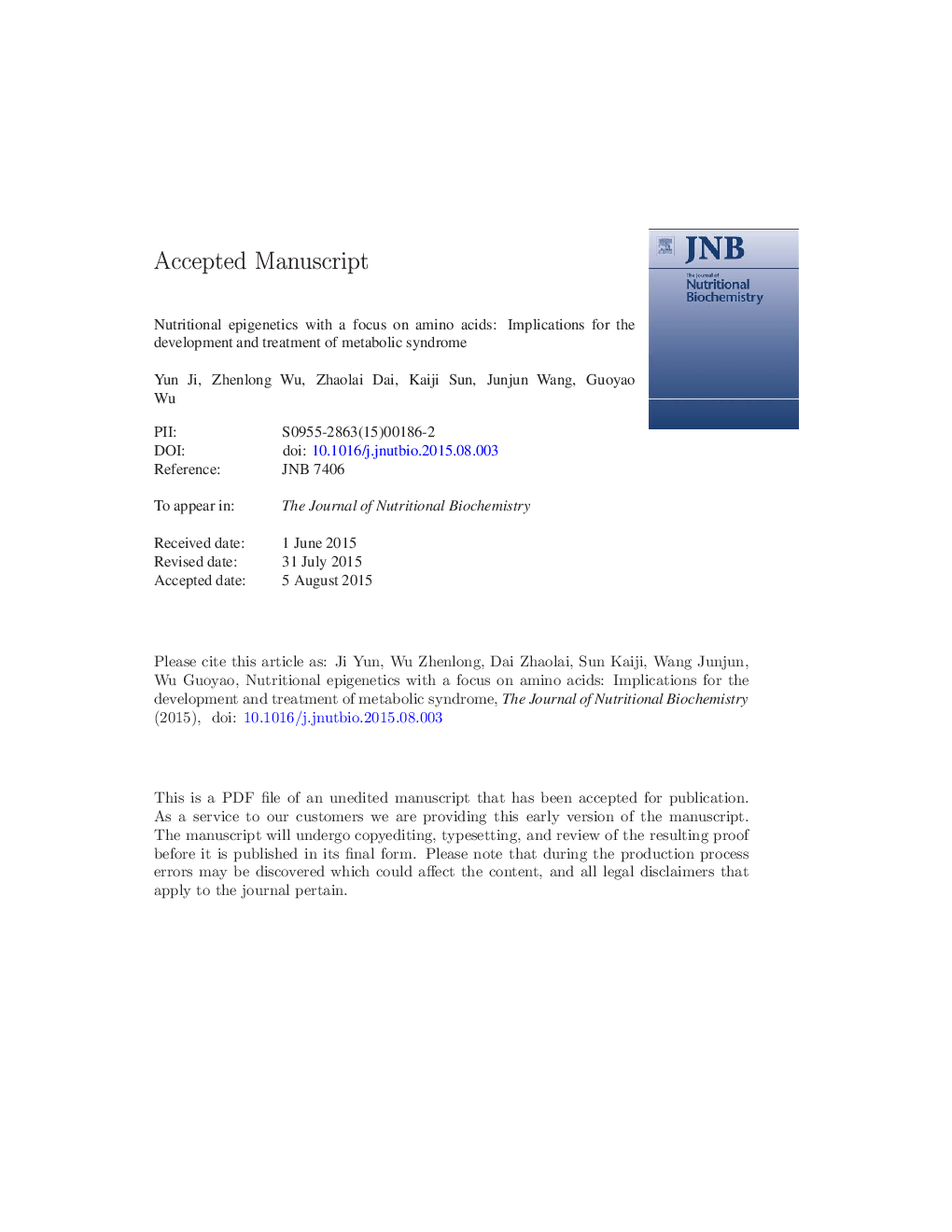| کد مقاله | کد نشریه | سال انتشار | مقاله انگلیسی | نسخه تمام متن |
|---|---|---|---|---|
| 8336664 | 1540641 | 2016 | 32 صفحه PDF | دانلود رایگان |
عنوان انگلیسی مقاله ISI
Nutritional epigenetics with a focus on amino acids: implications for the development and treatment of metabolic syndrome
ترجمه فارسی عنوان
اپی ژنتیک تغذیه با تمرکز بر اسیدهای آمینه: پیامدهای توسعه و درمان سندرم متابولیک
دانلود مقاله + سفارش ترجمه
دانلود مقاله ISI انگلیسی
رایگان برای ایرانیان
کلمات کلیدی
موضوعات مرتبط
علوم زیستی و بیوفناوری
بیوشیمی، ژنتیک و زیست شناسی مولکولی
زیست شیمی
چکیده انگلیسی
Recent findings from human and animal studies indicate that maternal undernutrition or overnutrition affects covalent modifications of the fetal genome and its associated histones that can be carried forward to subsequent generations. An adverse outcome of maternal malnutrition is the development of metabolic syndrome, which is defined as a cluster of disorders including obesity, hyperglycemia, hyperinsulinemia, hyperlipidemia, hypertension and insulin resistance. The transgenerational impacts of maternal nutrition are known as fetal programming, which is mediated by stable and heritable alterations of gene expression through covalent modifications of DNA and histones without changes in DNA sequences (namely, epigenetics). The underlying mechanisms include chromatin remodeling, DNA methylation (occurring at the 5â²-position of cytosine residues within CpG dinucleotides), histone modifications (acetylation, methylation, phosphorylation, ubiquitination and sumoylation) and expression and activity of small noncoding RNAs. The enzymes catalyzing these reactions include S-adenosylmethionine-dependent DNA and protein methyltransferases, DNA demethylases, histone acetylase (lysine acetyltransferase), general control nonderepressible 5 (GCN5)-related N-acetyltransferase (a superfamily of acetyltransferase) and histone deacetylase. Amino acids (e.g., glycine, histidine, methionine and serine) and vitamins (B6, B12 and folate) play key roles in provision of methyl donors for DNA and protein methylation. Therefore, these nutrients and related metabolic pathways are of interest in dietary treatment of metabolic syndrome. Intervention strategies include targeting epigenetically disturbed metabolic pathways through dietary supplementation with nutrients (particularly functional amino acids and vitamins) to regulate one-carbon-unit metabolism, antioxidative reactions and gene expression, as well as protein methylation and acetylation. These mechanism-based approaches may effectively improve health and well-being of affected offspring.
ناشر
Database: Elsevier - ScienceDirect (ساینس دایرکت)
Journal: The Journal of Nutritional Biochemistry - Volume 27, January 2016, Pages 1-8
Journal: The Journal of Nutritional Biochemistry - Volume 27, January 2016, Pages 1-8
نویسندگان
Yun Ji, Zhenlong Wu, Zhaolai Dai, Kaiji Sun, Junjun Wang, Guoyao Wu,
